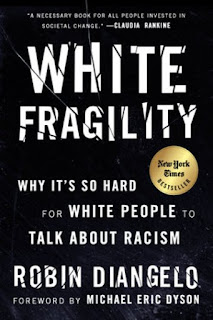Exploiting the White Liberal Guilt Complex
Posted by John Engelman Raceology, April 2020
Edited by Independent Thinker
Robin
Diangelo, White Fragility: Why It’s So Hard For White People To Talk About
Racism, Beacon Press, Boston, 2918, 168 pp., $16.00 (paperback)
In White Fragility: Why It’s So Hard For
White People To Talk About Racism, Robin Diangelo claims that we whites do
not want to talk about our racism because we do not want to admit that we are
racists.
Robin
Diangelo expects whites to be forever saying the secular equivalent of “Forgive
me Father for I have sinned.” The civil rights legislation that we passed and
the anti-poverty programs designed specifically to help blacks that we finance
with our tax money were not nearly enough to absolve us of our guilt. The fact
that blacks still tend to be less prosperous than we are is proof of our sinful
nature. Black problems are my fault, my own fault, my own most grievous fault.
Mea culpa, mea culpa, mea maxima culpa.
Robin
Diangelo is a professional diversity consultant. She earns a good living
telling groups of whites how racist they are.
In her
Introduction Robin Diangelo writes, “I am a white woman. I am standing beside a
black woman. We are facing a group of white people in front of us. We are in
their workplace and have been hired by their employer to lead them in a
dialogue about race.”
When she discovers that they are angry at her she
responds with hurt innocence, saying, “I have after all, only articulated a
definition of racism.”
I suspect
they were angry because their employer required them to sit through the
scolding of two well paid Social Justice Warriors, and they knew that it would be
dangerous for them to discuss the feelings they have about Negroes – feelings
based on experiences, and facts that can be easily documented. In an
environment like this, blacks are encouraged to talk about how whites have hurt
their feelings. Whites are forbidden to talk about how blacks have hurt them by
mugging them, shooting them, and killing their friends and relatives. If whites
mention black crime at all we are expected to blame it on white racism.
This is not
the dialogue on race the United States needs to have. This is totalitarian re-education. In a real dialogue, whites will be able to safely talk about how we
feel about blacks and why. Without endangering their careers geneticists will
be able to discuss their discoveries of genes that determine intelligence and
influence criminal and sexual behavior, and how these genes are found in
different proportions among the races.
When a white
school teacher makes a comment about her experience with a black person that
Robin Diangelo condemns as “racially problematic,” she tells the school
teacher, “I am going to ask you to consider not telling that story in that way
again…I am only asking you to try to listen with openness.” After making it
clear that she will not listen to the white school teacher, Robin Diangelo
expects the white school teacher to listen to her. This is a monologue on race
that she is forcing white employees to endure in order to safeguard their
jobs.
When she
dismisses the right of whites who participated in civil rights demonstrations
to claim to be innocent of racism, Robin Diangelo asks, “Might many [white
civil rights activists] have dominated discussions, not listen to others, and
assumed to know what was best?” She has described herself.
Robin
Deangelo writes, we “see stereotypical depictions of black people in the
media…we live in a culture that circulates relentless messages of white
superiority.”
What culture
is she writing about? The message we currently get from Hollywood movies and
television programs is that blacks perform and behave at least as well as
whites. If a white person kills a black man, even in self-defense, that is
reported nationally. The media takes the side of the black man, even when, as
is nearly always the case, he was breaking a law. When a black man kills a
white person to rob him or her, the local newspaper frequently does not report
the event, or refuses to report the race of the criminal.
In the Shaft
movie, the protagonist John Shaft is described as “a sex machine with all the
chicks” (rather than as a responsible husband and father, which John Shaft
definitely is not). This description is presented as a compliment.
Robin
Deangelo writes, “Today we depict blacks as dangerous, a portrayal that
perverts the true direction of violence between whites and blacks since the
founding of this country.” She does not seem to realize it, but times have
changed. In the America that has resulted from the civil rights movement,
whites are far more likely to be victims of black violence than the other way
around.
She claims, “Affirmative action is a tool to
ensure that qualified minority
applicants are given the same employment opportunities as white people.” Again she lives in a world of her imagination.
Affirmative action discriminates against whites and Orientals, lowers standards
for blacks, and advances many blacks to positions where they are obviously unable
to perform adequately.
She writes,
“A 2015 study by the American Sociological Foundation found that the the
highest level of segregation is between blacks and whites, the lowest is
between [Orientals] and whites, and the level between Latinx [sic] and whites
occupies an intermediate position.”
I feel
almost embarrassed to have to explain why this is true: Orientals have a crime
rate that is slightly lower than the white crime rate; Hispanics have a crime
rate that is somewhat higher than the white crime rate; blacks have a crime
rate that is vastly higher than the
white crime rate.
Robin
Diangelo writes, ”George Zimmerman would not have stopped me as I walked
through a gated suburban neighborhood.”
That is
because middle aged white women have an incomparably lower crime rate than
young black men. If George Zimmerman had followed a young white man, the young
white man would have walked over to George Zimmerman, keeping his hands in
sight, and apologized for creating suspicion. Then he would have explained who
he was and why he was there. That is what I did in a similar situation. It is
the way civilized people behave.
Trayvon
Martin was too ghetto to do that. He felt dissed, so he attacked George
Zimmerman from behind, threw him on the ground, and began punching him in the
face. George Zimmerman shot Trayvon Martin in self-defense.
Robin
Diangelo claims that the worst racists are the whites who deny that they are
racist. She dislikes the line in Martin
Luther King’s “I have a dream” speech, where he says, “I have a dream that my four little children
will one day live in a nation where they will not be judged by the color of
their skin but by the content of their character.”
She writes,
“Anti-blackness is rooted in misinformation, fables, perversions, projections
and lies.” What misinformation? What lies? What she writes is true of the anti-racism Robin Diangelo expresses in White Fragility. Again and again in
this book she makes statements that are either misleading, or not true. She is
used to getting away with this because she is used to speaking before captive
audiences of white employees who have been ordered to attend her scolding
lectures, with the understanding that if they express their opinions they will
be risking their jobs.
Nowhere in
this book is there any acknowledgement that by every objective, measurable
criterion blacks tend to be significantly less intelligent than whites. Nowhere
is there any mention that blacks have a crime rate that is eight times the white
rate, and an illegitimacy rate three times the white rate. Nowhere is there any
understanding that a race with these characteristics is likely to arouse a low
opinion of itself.
When I am
told that I am a racist, I do not say that I have had black friends, although I
have. I do not say that I have a high opinion of Orientals, although I do. I
ask two questions: “What did I say that is not true? How do you define racism?”
I do not use
the n-word. I do not tell racist jokes. I do not liken blacks to apes. I
readily acknowledge that there are some blacks who perform and behave better
than most whites.
When I make
a statement Robin Diangelo would consider to be “racially problematic,” it is
either based on experiences I have had with blacks, or it is a fact I can
easily document. If by her definition I am a “racist” I do not feel one bit
guilty about it. The fear of being called a “racist” interferes with the
dialogue on race people like Robin Diangelo claim to be leading, while doing
everything they can to suppress.
A modified version of my book review can be found on American Renaissance:
https://www.amren.com/features/2020/05/white-fragility-robin-diangelo-racism/
A modified version of my book review can be found on American Renaissance:
https://www.amren.com/features/2020/05/white-fragility-robin-diangelo-racism/


Comments
Post a Comment